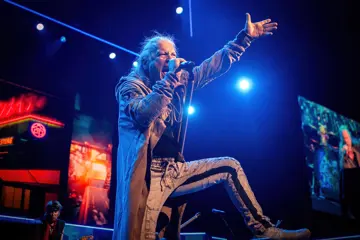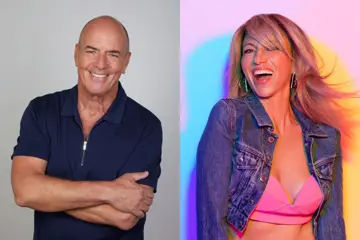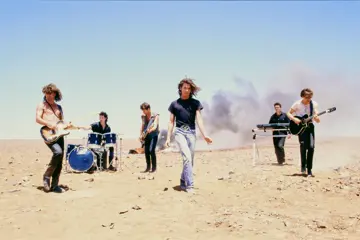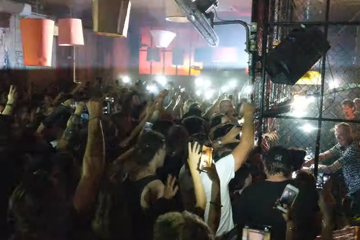The 2023 Australian Women In Music Awards (AWMAs) are fast approaching – returning to its established home in Meanjin/Brisbane, this year’s edition will be held at the climax of a two-day conference and performance program on Tuesday September 26 and Wednesday 27.
READ MORE: Judy Stone AM: ‘We Need The Australian Women In Music Awards Now More Than Ever’
At the heart of the AWMAs is its founder, executive producer and program director, Vicki Gordon. As she explains in her own words, the momentous event was launched in 2018 “to redress the chronic gender inequality in the Australian music industry” – a scourge that pretty much every woman involved in the industry (even tangentially so) will attest to persisting. But in celebrating and amplifying the feminine energy that does in fact surge across all facets of the industry – as well as creating tangible opportunities for women to thrive and further intensify that surge – Gordon has had an immeasurably positive impact on the state of play in Australian music.
Ahead of this year’s AWMAs, we sat down with Gordon to peer behind the scenes and learn why the event is still crucial in 2023 – as well as celebrate all the good it’s achieved, and look to the exciting future awaiting it. Read our Q&A below, then head here for all the info on the 2023 AWMAs.
What are you most looking forward to seeing/doing at this year’s Australian Women In Music Awards?
Honestly, AWMA in itself is nothing less than a miracle, so to be celebrating AWMA again, after months and months of tireless dedication from the unflinching AWMA team, is what I look forward to the most.
Since 2018, have you noticed many significant shifts in the ways women are perceived and embraced within the industry?
Don't miss a beat with our FREE daily newsletter
AWMA is an event whose time has come in an industry which has shown meagre leadership historically toward gender equality and placed little value on the importance of women's contribution to the sector. The recent changes that have occurred are somewhat predictable – ie. an increase of women on the Boards of our major orgs and the delivery of a very important review confirming “that women do not thrive to the same extent as men” and “young people and people of diverse backgrounds can be at particular risk of harm and poor employment practices”.
A number of music companies have now empowered women to take stronger leadership roles and there is genuine engagement and robust conversation about inclusivity happening everywhere. However, just last week two major festival promoters announced new lineups where female artists and musicians were a glaring minority and in one case were virtually nonexistent. At BIGSOUND I was horrified to find myself in a conversation with a woman, in a position of power, who believes that gender equality will work itself out and there is no need for any further intervention.
Beyond acknowledging and championing women with the awards themselves, the AWMAs host several artist- and industry-forward programs, workshops, internships and the like. How have you found these to have a tangible impact on the landscape of the Australian music industry?
As well as our ceremony and concert, we deliver a conference program which includes a series of forums and panels, a First Nations women’s music showcase and an ‘In Conversation’ keynote address with a high-profile artist. We also produce our QLD Regional and Remote program which prioritises First Nations and culturally diverse artists, and we create internships for female students in technical and marketing areas which usually result in employment.
We have also developed an amazing partnership with SSI and BMAC to provide opportunities for six to eight culturally diverse female artists or music practitioners to immerse themselves in every aspect of AWMA. We know for these women, and for those participating in our broader programs, the AWMA experience can and has been life-changing for them! Tangible outcomes can only be measured when individuals and communities are impacted in a positive way, and this is what creates change.
There is also a focus on First Nations artists and those in non-metro locations, primarily through the AWMAs’ QLD Regional & Remote Women’s Music Program. Why is it important to allocate resources to artists in the more remote areas of Australia?
AWMA's model of engagement forges pathways for female First Nations and multicultural artists, marginalised and/or disadvantaged female, non-binary and gender-nonconforming artists, musicians and music practitioners who struggle with access and support due to gender and geographical location. Our community engagement increases with every event growing exponentially. There is wealth of untapped talent in regional and remote Australia and the only thing often holding these people back is a lack of access and opportunity. AWMA is committed to providing this as part of our bigger mission to empower women, non-binary people and the LGBTQI+ community.
This year also sees the AWMAs establish two new titles with the Heavy Music Award and the Executive Leader Game Changer Award. What is the importance, for you, in highlighting these areas of the music industry at the AWMAs?
AWMA is committed to identifying areas in which women are underrepresented and/or are seemingly invisible, and the heavy music scene is just that: a space where women have had to prove they are strong enough to handle the genre, strong enough to hold their own in the pit at a gig, strong enough to captivate and hold a crowd’s attention and strong enough to scream as well as any man... and the list goes on.
The ARIA Executive Leader Game Changer Award was established to identify an individual across any gender that has the vision, integrity/ethics to drive positive industry change. It is critical for the future of the industry to recognise and support exceptional leadership which is committed to bringing about equality for women.
How do you see the AWMAs continue to grow in future editions? Do you have a vision for what the awards (and company) might look like years from now?
AWMA is driven and led by professionals who have first hand experience of the challenges faced by female and LGBTQI+ artists and practitioners working or entering the Australian music industry. Our philosophy is to help make careers sustainable and equity is an indivisible component of this.
A number of significant industry announcements and events after the inaugural AWMA in 2018 started to reflect a cultural shift across the sector which we have not previously seen before. AWMA continues to lead this shift and is determined that this transformation will continue to a deep, sustained systemic level with female representation backstage and on stage, in the community, on all music industry boards but especially our peak music industry boards, in senior management roles, including as professional advisors, technicians, engineers and producers.
Significant change needs to occur at a both a state and federal policy level to ensure women form an equitable part of the industry. We are excited to see the former sex discrimination commissioner Kate Jenkins appointed to lead a new body to protect arts and culture workers, and Music Australia is now established – however, gender equality criteria must be an essential component in deciding public funding outcomes, because gender bias can only be addressed by prioritising inclusivity and representation as core music industry values.
What can fans of Australian music do to highlight – and more importantly, challenge – the gender imbalance that continues to exist in the industry, from a grassroots level?
Let’s not fool ourselves into thinking the job is done! Educate yourself about gender equality and why it is so important for the future growth of the industry. Call out male-dominated stages and lineups, call out harassment and bullying, call out homophobia and racism, call out sexism and misogyny, call out non-inclusivity everywhere, reach out, and follow and support the work of AWMA.
See here for more information on the 2023 Australian Women In Music Awards.















